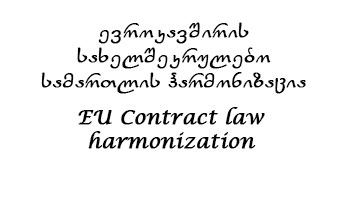In 1989, the Parliament adopted a resolution on action to harmomze the private law of the Member States. In this resolution, the Parliament emphasized that “the most effective way of carrying out harmomzation with a view to meeting the Community’s legal requirements in the area of private law is to unify major branches of that law,” such as contract law. The goal of the Parliament’s resolution is to draft a common European Code of Private Law. The resolution noted, however, that each Member State must decide whether to participate in this undertaking. Thus, the Parliament’s resolution will probably have no practical significance at all. It is significant, however, as an illustration that ideas of harmomzed codification are expressed and taken seriously within the EC. The Parliament’s resolution emphasized the need for comparative legal studies in order to achieve the goal of creating a common European Code.” Most general proposals to harmomze contract law in Europe have come from legal scholars, and legal literature strongly emphasizes the role of comparative legal research as a means for harmonizing European private law. The drafting of a “Restatement of European Law,” in the field of contract law, is presented as a task for legal science.” The progress towards harmonization should be supported by a European legal education and textbooks on common European private law.
Despite this pressure, a harmomzation of general contract law in Europe aimed at reaching more or less identical norms appears difficult to achieve. Some of the difficulties are connected with the great variations between the laws of the EC Member States. Since the CISG has demonstrated that variations can be overcome, to some extent, with practically oriented regulation, I will only briefly touch on the latter. Opponents of EC legislation in tins area stress that Community legislators do not have the power to enact legislation to harmonize Member State contract law. Earlier, different opinions were expressed concerning the “constitutionality” even of the EC Directive on Unfair Contract Terms. Some claimed that Article 100 of the Treaty of Rome, winch empowers the Council to issue directives for approxinizmg national norms directly affecting the establishment or functioning of the common market. The debate shows that the powers of the Community legislator are restricted in the area of contract law. One cannot assume today that general contract law could be largely harmomzed through EC legislation. The road towards a unified European legal order is certainly very long and cumbersome.





